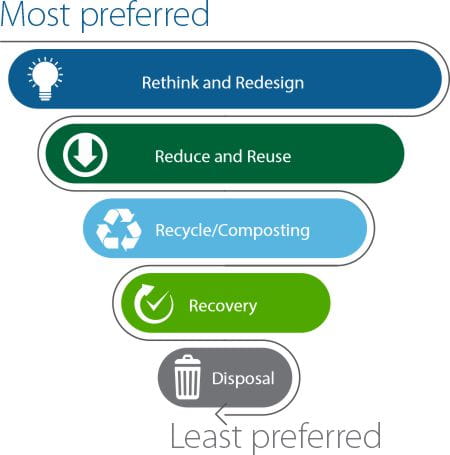
Saskatchewan's Growth Plan: The Next Decade of Growth 2020-2030 envisions 1.4 million people living in the province by 2030. With this goal in mind, we need your help to manage our solid waste to ensure our landfills are not overwhelmed and the environment remains healthy and resilient.
The first step in responsible and sustainable waste management is to reduce how much waste you are creating and what is going into the garbage. The rest can be diverted into other programs, such as recycling and composting.
The Waste Hierarchy
Get to know the waste management hierarchy! The top of the waste hierarchy focuses on manufacturers rethinking and redesigning products and materials to create less waste. The hierarchy then emphasizes material reduction and reuse, followed by recycling and composting, then energy recovery and finally disposal.

Reduce and Reuse
Buying quality products that last longer or reusing what you have on hand are better options than throwing your items in a recycle bin or garbage can. Donating, selling and reusing items are all actions you can take to reduce waste.
Before you buy something, ask:
- Do I need this?
- Can I borrow this?
- Can I rent this?
- Can I make this?
- Can I buy it second-hand?
- Is there another product that I can use that is recyclable?
If you notice a household habit that creates waste consistently, like using paper towels, sandwich baggies or single-use bottles like shampoo, try creating a new habit with reusable or refillable options.
Small changes to some of your habits can make a huge difference!
Recycling
Do you know that Saskatchewan offers one of the most robust suites of recycling programs in Canada?
Know what can be recycled before you throw it in the garbage!
Find out more about waste reduction
For information on recycling other products or to learn how to reduce, reuse, reclaim or repurpose items before they become waste, visit the Saskatchewan Waste Reduction Council.
Composting
Composting is an easy way to decrease the amount of garbage you produce and reduce methane gas production in landfills.
Composting can be done at any scale – at home, in a community or industrially.
It’s also easy! Check out the backyard composting 60-second video series from the Saskatchewan Waste Reduction Council.


